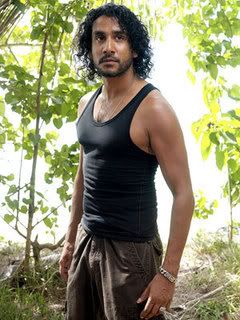Naveen Andrews, in fact, could once have staked his claim as the poster boy of tortured stars.
Andrews, who plays former Iraqi soldier Sayid in mystery drama Lost, was born in London to Indian immigrants and left home at 16. By 17, he'd won a scholarship to London's renowned
Guildhall School of Music and Drama and a year later moved in with his teacher, 15 years his senior, with whom he had a son.

Scoring a role in the drama Kama Sutra: A Tale of Love, loomed as his first major break, but the shoot in India set Andrews on a life-threatening downward spiral.’’I was on everything in India,'' he has said.’’In India, the heroin is pure.
‘‘Now I'm in the States I realise there are alternatives to the way I'd been living (in India and the UK).
I am profoundly grateful to have got out.''
Andrews started to turn his life around in 1998, when he left London for Los Angeles for a role in Mighty Joe Young.
Though Andrews, 39, can present as prickly and impatient, someone who loathes interviews, he also is capable of blunt assessment of his own hits and misses.
He sighs with relief when he says he no longer pursues the kind of escapism that risked career and life.
He insists if the success he's enjoying now had happened 10 years ago, it would have sent him mad. What, exactly, has changed?
‘‘I was still drinking and using then, you know. And I've been sober for five years. This really has to do with this business, not Lost, really. (It's about) the way different individuals react under pressure. David Carradine did Kung Fu and ended up thinking he was Kung Fu, you know what I mean, which is a sad thing to happen to a very good actor. ‘‘It's something most human beings are susceptible to and I'm glad I wasn't -- as a result of being older and sober.''
Like his Lost castmates, Andrews is aware the security of a weekly pay cheque could disappear any minute.
Few in the cast are considered safe from sacrifice, though Andrews gives the impression he thinks he'll be around for a while yet.
This is not to say that he's entirely happy with the way the show has evolved. Andrews feared he and other foundation cast were in danger of becoming redundant when producers resolved to spice up the show by introducing new characters.
’’I guess it goes with being a member of the original cast. You can't help it. It's like animals sensing danger, you know. Like when a new bunch of animals comes along you're going, ‘Who the f--- are you? F--- off'. You're protective. But the ground on which you stand is constantly being rearranged by the writers. You have to accept that.
‘‘At the end of season three you did see the idea that some characters would actually leave the island. You see them in the future. One looks for dramatic shifts, especially when you're on a series. Hopefully, you want to be able to do things that are new and exciting compared with the usual grind.''
There's no question Andrews was under-used by the show's writers through the third season.
He has infused Sayid, a former member of the Iraqi Republican Guard, with threads of unpleasantness, but worked equally hard to bring humanity to the character.
Fans will expect Sayid to feature heavily in future story arcs.
Asked if he finds his artistic yearnings to be satisfied on the show, he offers: ‘‘Occasionally, yeah. I mean, that's how I feel about acting generally. Occasionally it's fun. When I say that, I mean it's (fun) between action and cut.
‘‘The actual fear of getting up in the morning, having to go there. To sit here and talk to you . . . it hasn't got much to do with it, but between action and cut there's still some good moments. I guess that's what keeps you going.
‘‘And the money probably.''
Andrews was initially reluctant to sign on for Lost. He figured it would be difficult to sustain interest in a drama where a plane crashes on an island and a handful of passengers survive.
How many permutations of that same crash-survivor situation could you possibly get?
His concerns were assuaged by the producers, who promised the show would offer an ongoing cerebral puzzle. There have been times, however, when the stories have ventured dangerously off course.
‘‘Things weren't black and white,'' he says of season one.
‘‘One (Sayid) could be violent, and yet romantic, physically capable and yet vulnerable in other areas. That (complexity) is what we try to hold on to, despite the ebbs and flows of the writing.
‘‘You want to do right by a whole community of people -- not just Arabs, but the entire Muslim world,'' he adds, of playing Sayid.
‘‘Occasionally, you have to remind the writers there's certain things that would be really stupid to do. I can remember getting a scene where (Sayid was) praying before going to go do somebody in or shoot somebody. And I went, ‘You know, I'm not going to do that'. He's not a terrorist, you know what I mean?
‘‘The whole point of having somebody who had violence as part of his history and make-up was that he was also a romantic.
‘‘If that (scene) actually ended up on film, it would just not be good. Occasionally you have to put your little foot down.''
Why could the writers not see that they would be placing Sayid in a situation that would alter the audience's perception of the character?
‘‘Well, they're tired, I think,'' he says.
‘‘I think they're writing away, they're in their little bunker and they tend to forget. True love tends to forget.''
Source:

No comments:
Post a Comment